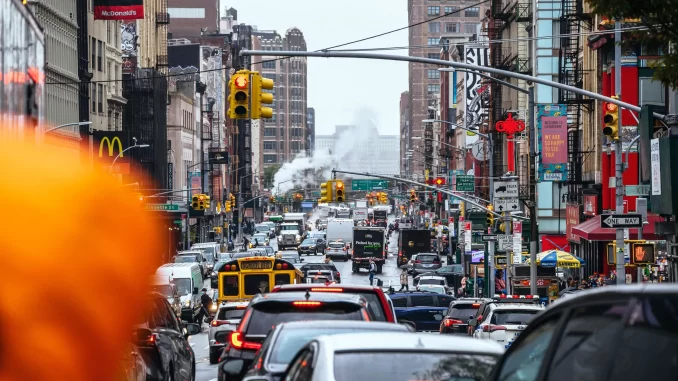
By Steve Levy
President Trump and Governor Hochul should collaborate on a master plan to eliminate congestion pricing, enhance federal aid, and finally get the MTA’s unsustainable spending under control.
Our Center for Cost Effective Government is proposing a collaborative effort to eliminate the congestion tolls and fees (recently lowered from $15 to $9 per drive into parts of Manhattan), while simultaneously securing an influx of federal aid to get the MTA through its funding crisis and establishing a long-term effort to curb the agency’s ever-increasing costs.
The state claims that congestion pricing will help fund up to $15 billion in projects over the next several years.
In exchange for the governor dropping these tolls that will cripple many middle-class motorists, the incoming president can upfront an outlay of federal aid to help offset the lost anticipated revenue. Our Long Island congressional delegation can lead the charge seeking an additional one-shot infusion of federal transportation aid to the MTA to cover the costs associated with its proposed multi-year plan. These impacted projects include Phase 2 of the Second Avenue subway, accessibility improvements at 18 subway stations, electrification of the Metro-North Hudson Line south of Croton-Harmon, and the purchase of the LIRR’s next fleet of electric train cars and diesel locomotives.
But the big catch will be that Hochul would first have to agree with a suggestion from our Center, as expressed in a September 23rd op-ed, that the MTA be placed under a financial control board that will have the authority to restructure contracts and eliminate onerous rules and regulations that have made the agency so inefficient.
Control boards come with the authority to rescind onerous contract provisions and inefficient rules and regulations that otherwise could only come about through collective bargaining. They can also put the brakes on excessive borrowing and establish oversight on all expenditures. Control boards have been used to revive New York City in the 1970s, as well as various New York counties, including Erie and Nassau, when they were on the precipice of financial collapse.
This is especially necessary for an MTA that has lost an estimated $690 million in unpaid fares and tolls in 2022, while compensating engineers and conductors $283,000 annually, and awarding $10,000-per-month pensions. More than 1,100 employees doubled their salaries in 2023 as the agency’s overtime bill skyrocketed to nearly $1.3 billion. One year, one MTA employee earned $344,000 in overtime alone. All this inefficiency has led to a budget gap of $2.5 billion in 2025 and 2026 and a tripling of subway service delays between 2012 and 2017.
We need our Long Island state delegation to call on the governor to postpone implementation of the congestion fees while the process to obtain an influx of federal funds unfolds. They, thereafter, need to work in conjunction with the governor’s office to implement a financial control board that could oversee future expenditures within the MTA.
The great news is that state Senator Dean Murray is introducing a bill to impose a control board on the MTA.
Our Center has long maintained that the MTA has a spending problem, not a revenue problem. Without a control board that can rein in the MTA’s ongoing fiscal mismanagement, it won’t be long until state leaders come back to taxpayers and motorists to seek yet another increase in fees and taxes to keep the agency afloat.
It is unlikely that the state would impose a control board without a carrot from the federal government. Likewise, the feds would be hesitant to provide more cash unless they saw a long-term plan to get a handle on the agency spending.
President-elect Donald Trump has already expressed his opposition to the congestion pricing plan, but he may be limited in his authority to curtail its implementation, at least as it applies to those not impacted by interstate commerce. He indeed may be willing to entertain a one-shot infusion of cash to the struggling MTA if it is linked to a long-term plan to streamline the agency, along the lines of what is being promoted in his newly appointed Department of Government Efficiency.
This proposal solves all the problems inherent in this congestion pricing dilemma. If successful, all sides could declare victory, especially the beleaguered taxpayers and motorists.
Steve Levy is Executive Director of the Center for Cost Effective Government, a fiscally conservative think tank. He served as Suffolk County Executive, as a NYS Assemblyman, and host of “The Steve Levy Radio Show.”

